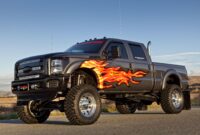Super Duty Ford Trucks For Sale: Your Ultimate Guide to Power and Performance sale.truckstrend.com
In the world of heavy-duty pickups, few names resonate with the same authority and capability as the Ford Super Duty. Engineered for relentless performance, unparalleled towing, and robust durability, Super Duty Ford trucks – encompassing the F-250, F-350, F-450, and even the F-550 chassis cab – are the undisputed champions for those who demand more from their vehicle. Whether you’re a commercial contractor hauling heavy equipment, an RV enthusiast embarking on cross-country adventures, or simply someone who needs a truck that can tackle the toughest jobs with ease, a Super Duty Ford truck is an investment in power, reliability, and peace of mind.
This comprehensive guide aims to be your definitive resource for navigating the market for Super Duty Ford trucks for sale. We’ll delve into the nuances of the lineup, explore the myriad benefits, offer practical advice for buyers, and address common questions to help you make an informed decision and find the perfect Super Duty to meet your demanding needs.
Super Duty Ford Trucks For Sale: Your Ultimate Guide to Power and Performance
Understanding the Super Duty Lineup: F-250, F-350, F-450, and Beyond
The Ford Super Duty family is designed with a tiered approach to capability, allowing buyers to select a truck perfectly matched to their specific requirements.
-
Ford F-250 Super Duty: Often considered the entry point into the heavy-duty segment, the F-250 offers significant upgrades over a half-ton truck like the F-150. It’s ideal for towing mid-size RVs, utility trailers, or for general heavy-duty work that doesn’t push the absolute limits. It balances robust capability with a slightly more manageable size and often a smoother ride than its larger siblings.

Ford F-350 Super Duty: Stepping up in capability, the F-350 provides increased payload and towing capacities, making it a popular choice for larger fifth-wheel campers, gooseneck trailers, and more demanding commercial applications. It’s available in both single-rear-wheel (SRW) and dual-rear-wheel (DRW, or "dually") configurations, with the latter offering maximum stability and hauling power.
-
Ford F-450 Super Duty: The F-450 is the king of conventional pickup trucks in the Super Duty lineup, designed for the absolute heaviest towing tasks. It comes standard with a wider front axle, larger brakes, and the powerful Power Stroke diesel engine, always in a dual-rear-wheel configuration. This truck is purpose-built for commercial haulers, heavy equipment transport, and the largest RVs on the road.
-
Ford F-550 Super Duty (Chassis Cab): While not typically sold as a consumer pickup, the F-550 is part of the Super Duty family and serves as a heavy-duty chassis cab for commercial upfitting. It’s the foundation for everything from dump trucks and service vehicles to large wreckers, showcasing the ultimate in Ford’s heavy-duty engineering.
Engine Options: Super Duty trucks are primarily powered by two robust engine choices:
- Gasoline V8: Typically a large displacement V8 (e.g., 7.3L "Godzilla" V8), offering strong performance, lower initial cost, and simpler maintenance. Excellent for stop-and-go work or those who don’t tow maximum weights constantly.
- Power Stroke Diesel V8: Ford’s legendary 6.7L Power Stroke V8 turbo diesel delivers immense torque, making it the preferred choice for maximum towing and hauling. While it has a higher initial cost and more complex maintenance, its fuel efficiency under load and sheer pulling power are unmatched.
Cab Configurations & Trim Levels: Super Duty trucks are available in Regular Cab (2-door), SuperCab (extended cab with small rear doors), and Crew Cab (4-door) configurations. Trim levels range from the utilitarian XL, the popular XLT, and the well-appointed Lariat, to the luxurious King Ranch, Platinum, and Limited, offering a spectrum of features, comfort, and technology.
Why Choose a Super Duty? Key Benefits and Advantages
The decision to purchase a Ford Super Duty truck is often driven by its undeniable strengths:
- Unmatched Towing and Hauling Capability: This is the primary reason most buyers opt for a Super Duty. With class-leading towing capacities that can exceed 40,000 pounds (with the F-450) and payload capacities reaching over 7,000 pounds (with the F-350 DRW), these trucks are built to move mountains.
- Durability and Longevity: Super Duty trucks are constructed with heavy-duty components, from their high-strength steel frames to their robust axles and transmissions. They are designed to withstand years of rigorous work and challenging conditions, leading to excellent longevity and strong resale values.
- Powerful Engine Options: Both the gasoline and diesel engines are engineering marvels, providing abundant power and torque for any task. The Power Stroke diesel, in particular, is renowned for its low-end grunt and ability to maintain speed on inclines, even with a heavy load.
- Advanced Technology and Safety Features: Modern Super Duty models are packed with cutting-edge technology. Features like Pro Trailer Backup Assist, Trailer Reverse Guidance, Blind Spot Information System (BLIS) with Trailer Coverage, adaptive cruise control, and pre-collision assist make towing safer and driving more convenient.
- Versatility: While designed for heavy work, a Super Duty can also serve as a comfortable daily driver (especially higher trims), a capable off-road rig (with FX4 package), or the ultimate family hauler for those with large boats or RVs.
- Strong Resale Value: Due to their reputation for reliability and capability, Super Duty trucks tend to hold their value well, making them a wise long-term investment.
Navigating the Market: New vs. Used Super Duty Trucks
When searching for Super Duty Ford trucks for sale, you’ll face the choice between new and used models. Each option presents distinct advantages and disadvantages.
-
Buying a New Super Duty:
- Pros: Access to the latest technology, features, and safety innovations; full factory warranty; customizable options (colors, packages); no prior wear and tear.
- Cons: Higher initial purchase price; immediate depreciation; potentially long wait times for specific configurations.
-
Buying a Used Super Duty:
- Pros: Significant cost savings; slower depreciation after the initial drop; wider selection of model years, trims, and configurations; ability to get more truck for your money.
- Cons: No factory warranty (or limited remaining warranty); potential for wear and tear, unknown maintenance history; older technology; might require more immediate maintenance.
Practical Advice for Buying Used:
- Get a Vehicle History Report: Services like CarFax or AutoCheck can reveal accidents, service records, ownership history, and title issues.
- Professional Pre-Purchase Inspection (PPI): Even if it looks great, have a trusted mechanic inspect the truck thoroughly, especially the engine, transmission, brakes, and suspension. This is crucial for a heavy-duty vehicle.
- Test Drive Extensively: Drive it on various roads, including highways, and if possible, with a small load or trailer to assess its performance. Listen for unusual noises and check all features.
- Check for Recalls: Ensure any outstanding recalls have been addressed.
Key Considerations When Buying Your Super Duty
Making the right choice requires careful consideration of your specific needs and priorities.
- Intended Use: This is paramount. Are you towing a 15,000 lb fifth-wheel or hauling a pallet of bricks occasionally? Your primary use will dictate whether an F-250 gas, an F-350 diesel, or an F-450 is appropriate. Don’t overbuy if you don’t need the capacity, but certainly don’t underbuy for safety and performance.
- Towing & Payload Needs: Be precise. Know the Gross Vehicle Weight Rating (GVWR), Gross Combined Weight Rating (GCWR), and payload capacity you truly need. Always factor in the weight of passengers, gear, and any truck modifications. Safety margins are crucial.
- Engine Choice (Gas vs. Diesel):
- Gas: Lower upfront cost, simpler maintenance, often better for shorter trips or frequent cold starts.
- Diesel: Higher torque for heavy loads, better fuel economy when towing heavy, longer engine life potential, higher initial cost, more complex (and expensive) maintenance (e.g., DEF system, fuel filters). Consider your annual mileage and typical loads.
- Cab & Bed Configuration: Do you need space for a large family or crew (Crew Cab)? Or is a Regular Cab with an 8-foot bed sufficient for tools and materials?
- Trim Level & Features: Determine your budget and desired level of comfort and technology. Basic XL models are workhorses, while Platinum and Limited trims offer luxury amenities akin to high-end SUVs.
- Maintenance & Operating Costs: Super Duty trucks, especially diesels, can have higher running costs than lighter-duty vehicles. Factor in fuel, insurance, and the cost of parts and specialized maintenance. Diesel maintenance, including oil changes and fuel filter replacements, can be more expensive.
Where to Find Super Duty Ford Trucks For Sale
The market for Super Duty trucks is robust, offering several avenues for finding your ideal vehicle.
- Authorized Ford Dealerships:
- New Trucks: The primary source for the latest models, factory warranties, and financing options.
- Certified Pre-Owned (CPO) Trucks: Used trucks that have undergone a rigorous inspection and come with an extended warranty backed by Ford. Offers a balance of cost savings and peace of mind.
- Independent Used Car Dealerships: Often have a wide selection of used trucks, potentially at competitive prices. Always perform a thorough inspection.
- Online Marketplaces:
- Dedicated Car Sales Sites: Websites like AutoTrader, Cars.com, Edmunds, CarGurus, and TrueCar allow you to filter by model, year, price, features, and location.
- General Classifieds: Craigslist, Facebook Marketplace, and local online classifieds can be sources for private sellers. Be cautious and prioritize safety when meeting sellers.
- Private Sellers: Buying directly from an individual can sometimes lead to better deals as there’s no dealership markup. However, it requires more due diligence on your part regarding inspections and paperwork.
- Auctions: Government surplus, fleet sales, and public auto auctions can offer low prices, but they are typically "as-is" sales with no warranties, making them suitable for experienced buyers or those with mechanic knowledge.
Tips for a Successful Super Duty Purchase
- Set a Realistic Budget: Include not just the purchase price, but also sales tax, registration, insurance, potential upgrades, and an emergency fund for unexpected maintenance (especially for used models).
- Do Your Homework: Research specific model years for known issues or improvements. Read reviews, watch videos, and compare specifications.
- Test Drive Multiple Options: Don’t settle for the first truck you see. Drive different engine types, cab configurations, and even competitor models to ensure the Super Duty is truly the best fit.
- Negotiate Effectively: Be prepared to negotiate the price. Know the market value (using resources like Kelley Blue Book or NADA Guides) and be ready to walk away if the deal isn’t right.
- Secure Financing Early: Get pre-approved for a loan from your bank or credit union before visiting a dealership. This gives you leverage and a clear understanding of your budget.
- Understand the Warranty: For new trucks, know what’s covered and for how long. For used trucks, consider purchasing an extended warranty, especially for diesel models, for added protection.
- Don’t Rush: Buying a Super Duty is a significant investment. Take your time, do your research, and ensure you’re making the best decision for your needs.
Super Duty Ford Trucks Estimated Price Range Table (New & Used)
Please Note: Prices are highly variable based on model year, mileage, condition, trim level, engine type, drivetrain (2WD/4WD), specific features, regional market demand, and economic factors. These are estimated ranges and should be used as a general guide only. Always check current market values.
| Model | Condition | Trim Level Range | Estimated Price Range (USD) | Key Factors Influencing Price



